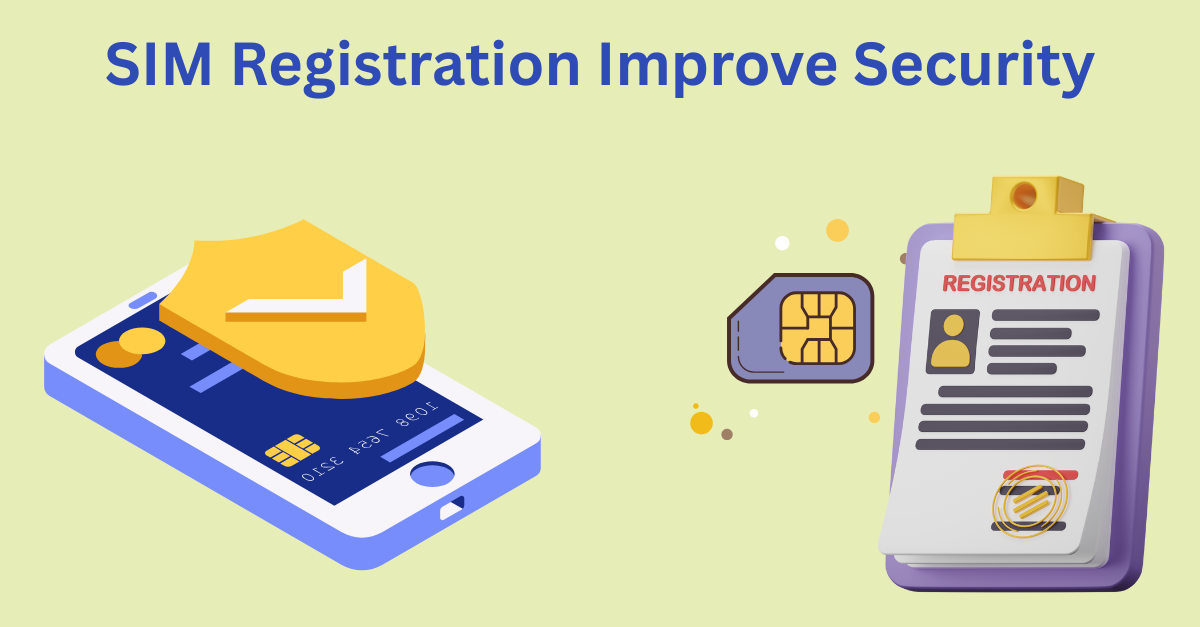In Pakistan, SIM registration has become a basic requirement for using mobile networks. But beyond just being a formality, this system plays a major role in improving mobile network security. Each registered SIM is linked to a verified identity, reducing risks like fraud, misuse, and unauthorized activities. Through SIM registration, mobile users are better protected from identity theft and network crimes, making everyday communication safer for everyone.
How SIM Registration Works in Pakistan
National Database Verification
When someone buys a SIM card in Pakistan, their details are verified against NADRA’s national database. This process ensures that only verified individuals can use mobile services, reducing the chances of misuse by anonymous users.
Biometric Verification System (BVS)
Biometric verification is now a mandatory part of SIM registration. This means fingerprints are collected to link each SIM directly to its rightful user. This advanced step has helped prevent SIM misuse in criminal or unauthorized activities.
Regular Updates and Reverification
Telecom companies regularly ask users to verify their SIM owner details, making sure that records stay up to date. This further improves the security of mobile networks.
Preventing Fraud and Illegal SIM Usage
Protecting User Identity
A major advantage of SIM registration is protecting user identity. By linking SIMs to verified individuals, it becomes harder for fraudsters to hide behind fake numbers. This also improves the chances of tracing misuse quickly.
Using tools like SIM ownership checking, users can also confirm the ownership of their mobile numbers. This adds an extra layer of personal protection and peace of mind.
Reducing Illegal Activities
Before biometric verification became common, fake SIMs were often used in illegal activities like scams or untraceable calls. With proper registration, this threat has been reduced significantly.
Supporting Law Enforcement
Proper SIM registration helps law enforcement agencies investigate cases faster. When mobile numbers are used in crimes, authorities can easily trace them back to their registered owners, speeding up investigations and reducing crime rates.
How SIM Registration Improves Mobile Network Security
Reducing Spam and Scam Calls
Spam calls, scam messages, and fake promotions were once a daily headache for many mobile users. SIM registration filters out many of these issues because scammers can no longer easily get anonymous numbers.
Stronger Digital Transactions
With the rise of mobile banking, registered SIMs offer better security for financial transactions. Knowing that every number is linked to a real, verified person increases trust in mobile banking services and digital payments.
Safer Online Accounts
Many online services use mobile numbers for verification. A properly registered SIM makes sure that accounts linked to those numbers are safer from hacking and unauthorized access.
Tracking Illegal Activities with SIM Data
Role in Modern Investigations
SIM registration is critical in helping law enforcement trace suspects involved in online or mobile crimes. Mobile numbers serve as digital footprints, making it easier to follow leads in criminal cases.
Using platforms like live tracker, investigators can track suspicious activities more efficiently, especially in cases involving digital scams or fraud.
Limited Role in Location Tracking
While SIM registration helps in identifying users, it doesn’t directly provide real-time location tracking. However, it complements other investigation methods, giving law enforcement an important starting point for deeper investigations.
Digital Security and User Awareness
Educating Users on Safe Mobile Use
While the system itself is robust, educating mobile users about securing their personal data is equally important. People should avoid sharing SIM details casually and use PIN codes for mobile security.
Personal Responsibility in SIM Usage
Mobile security doesn’t stop with registration. Users should monitor their SIM usage and regularly verify linked accounts, ensuring that no unauthorized person is using their mobile number.
Challenges and Future of SIM Registration in Pakistan
Current Challenges in Implementation
While SIM registration has improved mobile network security, it’s not without challenges. One major issue is the misuse of biometric verification by unauthorized agents. Some individuals exploit loopholes to issue SIMs against someone else’s CNIC, causing legal and privacy concerns for users. Despite strict policies by authorities like PTA, these gaps still exist in remote and underdeveloped areas.
Another hurdle is public awareness. Many users are still unaware of how to verify how many SIMs are registered against their CNICs. Without active participation from users, the system cannot fully protect against misuse.
Technological Advancements in Registration
To counter these issues, the introduction of digital SIM verification is gaining attention. With the growing use of mobile apps and portals, users can now access services like SIM registration checks from their smartphones. Authorities are also integrating databases for quicker verifications and immediate reporting of suspicious activity.
In the coming years, further integration with national identity databases will likely make SIM verification quicker, safer, and more transparent for everyone.
Why Public Cooperation Matters
Ultimately, the strength of the SIM registration system depends not just on technology or regulations, but also on users themselves. By regularly verifying their mobile connections, reporting misuse, and educating others, citizens play a critical role in strengthening mobile network security in Pakistan.
Conclusion
SIM registration plays a central role in making Pakistan’s mobile networks more secure. It not only protects users from identity theft but also supports law enforcement efforts in fighting crime. While the process has its challenges, combining smart registration systems with user awareness and responsible telecom policies will create a safer environment for all mobile users in Pakistan.
